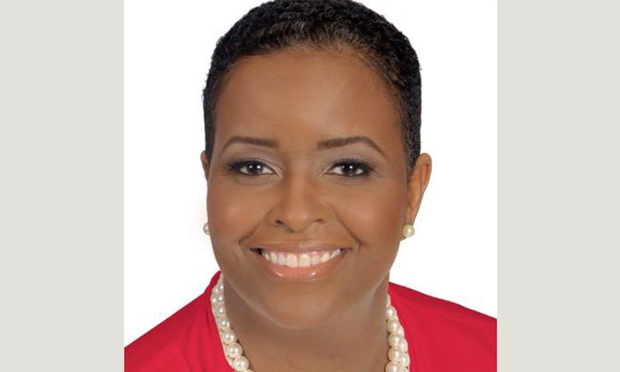Ex-Phila. Family Court Judge Younge to Stand Trial for Alleged Ethics Violations Early Next Year
The Pennsylvania Court of Judicial Discipline did rule, however, that Younge—who was transferred out of Family Court to the Philadelphia court system's civil division following a series of The Legal Intelligencer articles exposing Younge's history of violating parents' rights—will not be suspended while her case plays out.
October 02, 2019 at 06:05 PM
4 minute read
 Lyris Younge. Courtesy photo
Lyris Younge. Courtesy photo
Former Philadelphia Family Court Judge Lyris F. Younge, accused by state disciplinary authorities of due process violations and excessive delays in child custody cases, is set to stand trial Jan. 17.
However, the Pennsylvania Court of Judicial Discipline has ruled that Younge—who was transferred out of Family Court to the Philadelphia court system's civil division following a series of The Legal Intelligencer articles exposing Younge's history of violating parents' rights—will not be suspended while her case plays out.
But the court said in its Wednesday order that suspension was not off the table if new allegations of misconduct surface in the interim.
Younge's lawyer, Charles Gibbs of McMonagle Perri McHugh Mischak and Davis in Philadelphia, said the court's decision to not immediately suspend Younge was significant.
"I think the court determined there was not sufficient evidence to suspend Judge Younge," Gibbs said Wednesday. "We look forward to the court hearing all the evidence and not just allegations brought by the board."
He added, "Judge Younge is appreciative that she can continue the work that the people of this county elected her to do."
The Judicial Conduct Board filed its 10-count complaint against Younge on Aug. 20. The 68-page complaint alleged that in one Children's Fast Track appeal, Younge filed her responding opinion 261 days late. In 12 other matters identified in the JCB complaint, Younge's opinions were between 35 and 197 days late.
The complaint said Younge delegated the task of writing Children's Fast Track opinions to her law clerks, but failed to properly supervise them to ensure that the opinions were filed on time.
The JCB also brought ethics charges in connection with several incidents, many previously reported by The Legal, in which Younge prohibited parents and attorneys from testifying on their own behalf.
In one case, Younge refused to allow a mother to reenter the courtroom to testify at a termination of parental rights hearing after she had become ill and stepped out into the hallway. Younge ultimately entered an order terminating the mother's parental rights. On appeal, the Superior Court vacated the ruling and remanded the matter, after which Younge recused from the case.
In another matter, Brian McLaughlin, an attorney handling a family case before Younge, was held in contempt after being summoned to another judge's courtroom for a hearing that took longer than expected, making him late for his case before Younge. According to the appeal filed by McLaughlin and his lawyer, Karen Deanna Williams, Younge continually put off the contempt hearing for McLaughlin until it appeared that she had decided to let the matter go.
Then, during a scheduled hearing Jan. 23 for the family matter McLaughlin was handling, Younge allegedly ambushed him at the last minute with an unscheduled contempt hearing, according to the appeal. According to the JCB complaint, Younge found McLaughlin in contempt and fined him $750, but the Superior Court reversed that ruling this past April.
In each instance cited, the JCB said Younge "failed to accord to every person or entity who had a legal interest in a proceeding, or that person or entity's lawyer, the right to be heard according to law."
The JCB also said Younge "repeatedly demonstrated an improper demeanor that was impatient, discourteous, disrespectful, condescending and undignified."
"While presiding over cases in Family Court, Judge Younge repeatedly spoke harshly, yelled, screamed and berated attorneys, social workers, and others who appeared before her," the complaint alleged.
In one case, according to the complaint, Younge caused an attorney "to cry in open court, in front of her client and her colleagues" after the attorney arrived 14 minutes late for an immunization hearing.
The JCB also alleged Younge exhibited "a pattern of conduct of holding parents in contempt and ordering their detention, without conducting a contempt hearing," including in a case in which the Superior Court found Younge inappropriately locked up a grandmother at a court hearing because the grandmother did not know her 26-year-old daughter's whereabouts in a case involving her grandchild.
In several other matters, the JCB alleged, Younge applied the incorrect standard of law when ruling that the Philadelphia Department of Human Services failed to make reasonable efforts to prevent or eliminate the need for removal of a child from their home.
This content has been archived. It is available through our partners, LexisNexis® and Bloomberg Law.
To view this content, please continue to their sites.
Not a Lexis Subscriber?
Subscribe Now
Not a Bloomberg Law Subscriber?
Subscribe Now
NOT FOR REPRINT
© 2025 ALM Global, LLC, All Rights Reserved. Request academic re-use from www.copyright.com. All other uses, submit a request to [email protected]. For more information visit Asset & Logo Licensing.
You Might Like
View All

Am Law 100 Lateral Partner Hiring Rose in 2024: Report


Trending Stories
- 1Inherent Diminished Value Damages Unavailable to 3rd-Party Claimants, Court Says
- 2Pa. Defense Firm Sued by Client Over Ex-Eagles Player's $43.5M Med Mal Win
- 3Losses Mount at Morris Manning, but Departing Ex-Chair Stays Bullish About His Old Firm's Future
- 4Zoom Faces Intellectual Property Suit Over AI-Based Augmented Video Conferencing
- 5Judge Grants TRO Blocking Federal Funding Freeze
Who Got The Work
J. Brugh Lower of Gibbons has entered an appearance for industrial equipment supplier Devco Corporation in a pending trademark infringement lawsuit. The suit, accusing the defendant of selling knock-off Graco products, was filed Dec. 18 in New Jersey District Court by Rivkin Radler on behalf of Graco Inc. and Graco Minnesota. The case, assigned to U.S. District Judge Zahid N. Quraishi, is 3:24-cv-11294, Graco Inc. et al v. Devco Corporation.
Who Got The Work
Rebecca Maller-Stein and Kent A. Yalowitz of Arnold & Porter Kaye Scholer have entered their appearances for Hanaco Venture Capital and its executives, Lior Prosor and David Frankel, in a pending securities lawsuit. The action, filed on Dec. 24 in New York Southern District Court by Zell, Aron & Co. on behalf of Goldeneye Advisors, accuses the defendants of negligently and fraudulently managing the plaintiff's $1 million investment. The case, assigned to U.S. District Judge Vernon S. Broderick, is 1:24-cv-09918, Goldeneye Advisors, LLC v. Hanaco Venture Capital, Ltd. et al.
Who Got The Work
Attorneys from A&O Shearman has stepped in as defense counsel for Toronto-Dominion Bank and other defendants in a pending securities class action. The suit, filed Dec. 11 in New York Southern District Court by Bleichmar Fonti & Auld, accuses the defendants of concealing the bank's 'pervasive' deficiencies in regards to its compliance with the Bank Secrecy Act and the quality of its anti-money laundering controls. The case, assigned to U.S. District Judge Arun Subramanian, is 1:24-cv-09445, Gonzalez v. The Toronto-Dominion Bank et al.
Who Got The Work
Crown Castle International, a Pennsylvania company providing shared communications infrastructure, has turned to Luke D. Wolf of Gordon Rees Scully Mansukhani to fend off a pending breach-of-contract lawsuit. The court action, filed Nov. 25 in Michigan Eastern District Court by Hooper Hathaway PC on behalf of The Town Residences LLC, accuses Crown Castle of failing to transfer approximately $30,000 in utility payments from T-Mobile in breach of a roof-top lease and assignment agreement. The case, assigned to U.S. District Judge Susan K. Declercq, is 2:24-cv-13131, The Town Residences LLC v. T-Mobile US, Inc. et al.
Who Got The Work
Wilfred P. Coronato and Daniel M. Schwartz of McCarter & English have stepped in as defense counsel to Electrolux Home Products Inc. in a pending product liability lawsuit. The court action, filed Nov. 26 in New York Eastern District Court by Poulos Lopiccolo PC and Nagel Rice LLP on behalf of David Stern, alleges that the defendant's refrigerators’ drawers and shelving repeatedly break and fall apart within months after purchase. The case, assigned to U.S. District Judge Joan M. Azrack, is 2:24-cv-08204, Stern v. Electrolux Home Products, Inc.
Featured Firms
Law Offices of Gary Martin Hays & Associates, P.C.
(470) 294-1674
Law Offices of Mark E. Salomone
(857) 444-6468
Smith & Hassler
(713) 739-1250





